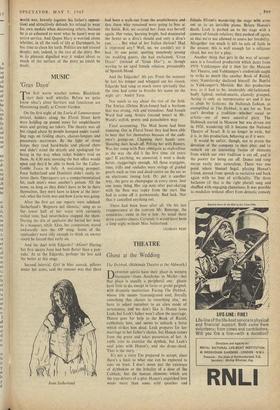MUSIC `Gran Dayo'
PHE. first warm weather comes. Blackbirds start their wolf whistles. Before we quite know what's afoot fioriture and fanaticism are blossoming madly at Covent Garden.
On the first night of the Lucia di Lammermoor revival, bidders along the Floral Street kerb were holding up pound notes for amphitheatre seats and getting no takers. The theatre was all but ringed about by people humped under travel- ling rugs on folding chairs, chaises-longues and pneumatic mattresses. By the light of street lamps they read hard-backs and played chess and didn't mind the drizzle and apologised for being in the way when ticket bidders trod on them. At 8.30 next morning the box office would open and they'd be able to book for the Callas- Gobbi Tosca in July. A sustaining prospect. Joan Sutherland and Donizetti didn't really in- terest them. Operagoers are a compartmentalised lot, each man's meat another's poison. All the same, so long as they didn't have to be in there themselves, they were keen to know at the inter- vals what the form was and how Lucia was going.
After the first act our reports were subdued. Sutherland's 'Regnava .nel silenzio,' sung as to the lower half of her voice with curiously veiled tone, had nevertheless stopped the show. During the din of applause she buried her nose in a bouquet, while Alisa, her companion, stared awkwardly into the OP wing. Some of the applauders were silly enough to think an encore could be forced that early on.
And the duet with Edgardo? Aiiitne! During her first stanza Joan had been flatter than a pan- cake. As to the Edgardo, perhaps the less said the better at this stage.
Second interval. Girl in blue anorak, pillows under her arms, said the rumour was that there Joan Sutherland had been a walk-out from the amphitheatre and that those who remained were going to boo at the finish. Rot, we assured her. Joan was herself again. Her voice, burning bright, had dominated the Sextet as a diva's should and only a diva's can. . . • But what of her Italian diction? Had it improved any? Well, no, we couldn't say it had. At one point, spotting somebody among the wedding guests, she had exclaimed, `Gran Dayo!' (instead of `Gran Dio!'), as though waving to an aged female relation, presumably of Spanish blood.
And the Edgardo? Ah yes. From the moment he lost his temper and whipped out his sword, Edgardo had sung so much more spiritedly that the time had come to breathe his name on the night air: Andre Turp.
Not much to say about the rest of the field. The Enrico (Delete Bryn-Jones) had a baritone that was strong, rich and tremulous. And Joseph Ward had sung Arturo (second tenor) in Mr. Ward's stylish, pretty and panacheless way.
Final accounting. The Mad Scene had been stunning. Out in Floral Street they had been able to hear that for themselves because of the audi- ence's goings-on. Clapping their hands sore. Shouting their heads off. Pelting her with flowers. Was her romp with flute obbligato as mahvellous as the way she did it the first time, six years ago? If anything, we answered, it went a shade better, staggeringly enough. All those arpeggios, runs, trills and roulades were strings of graded pearls each as true and dead-centre on the ear as an electronic tuning fork. Or, put it another way, she gave us champagne in every stave. Just one tenny thing. Her lop note after pair-skating with the flute was ropey from the start. She had to come off it prematurely. Bad luck. Not that it cancelled anything out.
There had been boos after all. On his last reappearance at the rostrum Mr. Bonynge, the conductor, came in for a few. As usual these drew counter-cheers. Certainly it would have been a limp night without Miss Sutherland.
CHARLES REID


































 Previous page
Previous page